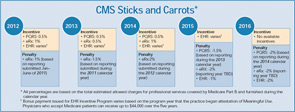The transition to the new code set will impact every core of the rheumatology practice (see Figure 1). Industry experts predict that ICD-10 will surpass Y2K and HIPAA compliance in terms of time requirements, financial investment, and the technology changes needed to accommodate conversion.
Preparation and education for the new code set is a crucial task for a successful transition, as is clear, concise, and regular communication to office staff.
Don’t miss the 2012 Webcast Series on ICD-10 implementation and transition beginning January 2012. ACR coding and practice management experts will give the guidelines and strategies necessary to navigate through these changes.
Visit www.rheumatology.org/practice for more information on the ICD-10 and practice management webcasts.
Increased Audit Initiatives
According to healthcare experts, key federal agencies will audit healthcare professionals’ documentation and compliance more aggressively in 2012. One of these agencies is the OIG, whose mission is to protect the integrity of federal and state funded programs for the health and welfare of its beneficiaries. The OIG will protect HHS programs through a nationwide network of audits, evaluations, investigations, and enforcement to promote efficiency and compliance and limit economic waste.
Understanding the risk areas in documentation and coding will help avoid unnecessary audits, penalties, and fines. Compliance policies and procedures should be in place to address coding and billing issues to sustain quality assurance in 2012 and beyond. A practice’s best line of defense lies in regular training sessions on documentation guidelines, whether performed internally or through an outside consultant.
Compliance measures on supporting documentation for all services rendered and level of office visit billed to insurance carriers is explained in the ACR’s Rheumatology Coding Manual, which can be downloaded at www.rheumatology.org/publications. Education on coding and billing guidelines is a significant piece of the puzzle for a financially sound practice. More information on auditing and documentation guidelines can be found on the ACR website at www.rheumatology.org/practice.
CMS: Sticks and Carrots
Another key area that will affect practice management in 2012 is health informatics. CMS will administer several programs that will result in incentives and penalties applied in the 2012 calendar year, as well as penalties applied in future years that will be the result of provider’s action during 2012 (see Figure 2). Rheumatology practices should review these programs and take note of how they affect all providers in the practice, including rheumatologists, nurse practitioners, and physician assistants.

CMS e-Prescribing Incentive Program
In 2012, the CMS e-prescribing program will provide the opportunity for financial incentives to be applied during 2013, but there also will be penalties for those who do not meet the e-prescribing requirements. Eligible professionals who successfully e-prescribe will be qualified to receive an incentive of 1% of the total estimated allowed charges for professional services covered by Medicare Part B and furnished during 2011. Payment reductions for those who do not successfully meet e-prescribing reporting requirements during 2012 will be applied in 2014, and will equal a payment reduction of 2%.

